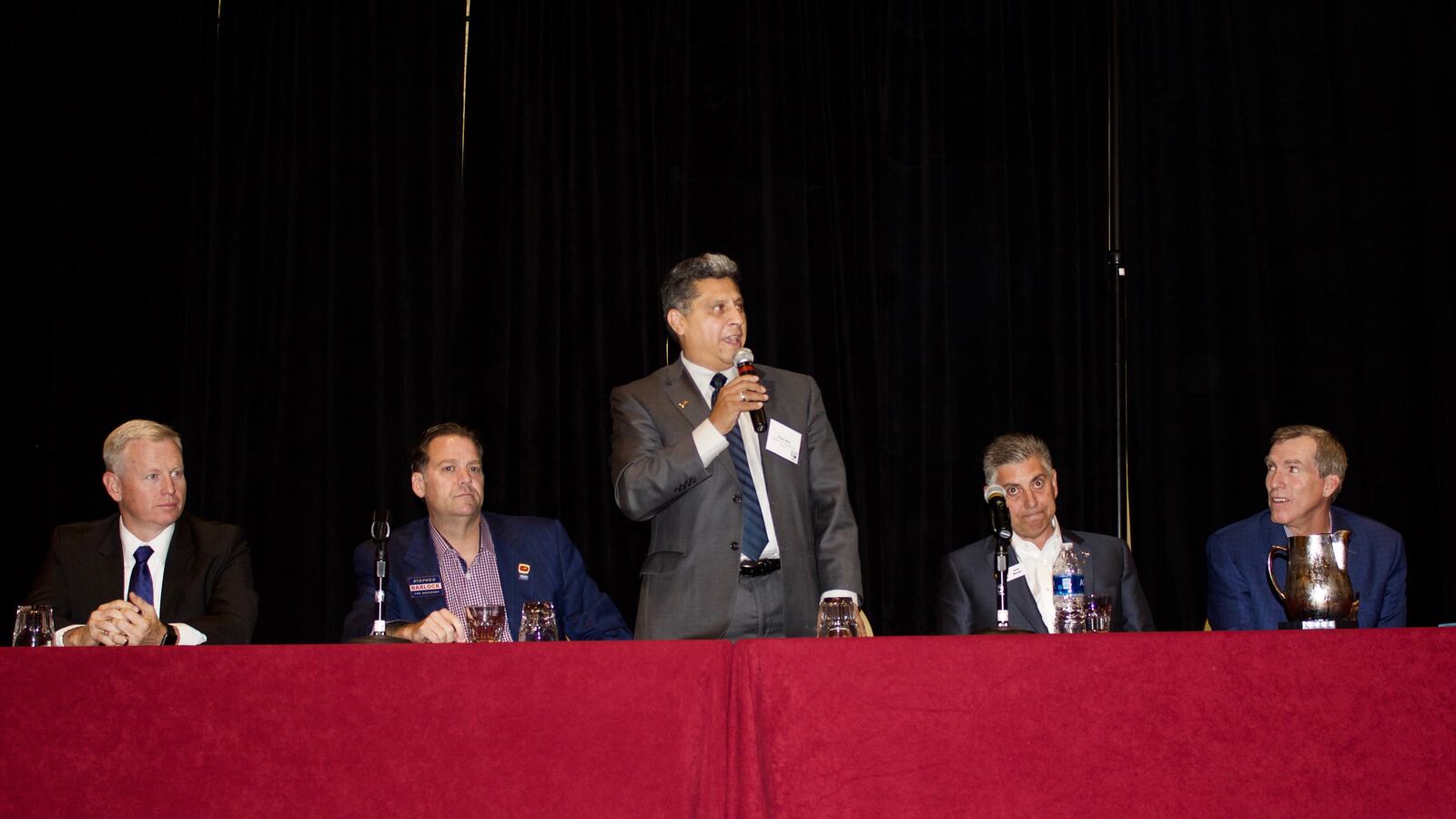Nine Republicans and Democrats hoping to become Colorado’s next governor offered contrasting views Friday of the state’s public schools to an audience of more than 100 local school board members.
Most of the five Republicans told the crowd of locally elected officials — who are charged by the state’s constitution with governing Colorado’s public schools — that their programs were in need of improvement and innovation, and that they were there to help.
The four Democrats hoping to succeed fellow Democrat Gov. John Hickenlooper, who is term-limited, pledged to reform the state’s tax code to send more money to schools.
The candidates spoke at the annual fall delegation conference of the state’s association of school boards.It was the first forum of its kind to address education issues exclusively this election election cycle.
Unlike previous elections, Colorado’s public education system has been a key policy debate early in the campaign. Several candidates, especially Democrats, have worked on education issues before.
Here are our five takeaways from the forum:
The Republican candidates didn’t pull any punches when they said the state’s public schools were in need of improvement — and several said that they were the ones to do it.
From District Attorney George Brauchler to businessman Doug Robinson, every Republican candidate said one part or another of the state’s school system needed to do better.
“Education is life itself,” said former state lawmaker Victor Mitchell. “And there is no greater challenge facing our state than 50 percent of our at-risk kids who graduate can’t complete college-level course work.”
Both Mitchell and Robinson pointed to their experience as entrepreneurs as evidence that they could help set the state’s schools free of what they consider unnecessary red tape. Brauchler called for empowering teachers and parents.
Every Democrat and several Republicans agreed that the state’s schools were in a “funding crisis.” But they offered very different paths forward.
It was an easy question for Democrats. Businessman Noel Ginsburg, former state Sen. Michael Johnston, former state treasurer Cary Kennedy and Lt. Gov. Donna Lynne were in lock-step that the state’s schools are in need of more money.
“If we don’t fundamentally solve this crisis, the rest of the issues don’t matter,” Johnston said.

Johnston and Kennedy forcefully pledged to take on the state’s Taxpayer Bill of Rights, which limits how much tax revenue the state can collect and requires voter approval to raise taxes.
Lynne was more tempered. While she acknowledged tax reform was needed, she said wanted a legislative committee working on school finance to complete its work before suggesting any overhauls.
Greg Lopez, the former mayor of Parker and a small business owner, was the only GOP candidate who said he would take on the state’s complicated tax laws. If elected, he promised to establish a committee to send a reform proposal to voters.
Robinson and Brauchler acknowledged that schools were in a funding crunch. But they stopped short of saying they’d send more money to schools.
Mitchell said “he wasn’t sure” if there was a funding crisis, but added, “The system should be reformed before it’s fully funded.”
PERA, the state’s employee retirement program, could play a prominent issue in the election — especially for Republicans.
Earlier at the conference, school board members received a briefing on a proposed overhaul to the state’s retirement program, which includes school district employees.
While the situation is not as dire as it was a decade ago, the program’s governing board has become so increasingly worried about unfunded liabilities that it’s asking state lawmakers to pass a reform package to provide more financial stability.
Two Republicans, Brauchler and Steve Barlock, who co-chaired President Trump’s campaign in Colorado, said PERA was in crisis. Barlock warned school board members that their budgets were in jeopardy as lawmakers fiddle with the system.
Neither went into any detail about how they hoped to see the retirement program made more fiscally stable. But watch for this issue to gain greater traction on the campaign trail, especially as Republican state Treasurer Walker Stapleton ramps up his gubernatorial campaign, and as lawmakers begin to wrestle with PERA reforms next year. (Stapleton did not attend the forum.)
Some candidates offered careful responses to a question about school choice. Others, not so much.
Every Democrat and one Republican, Brauchler, said they respected a family’s right to choose the best school for their children. But that choice, they said, should not come at the expense of traditional, district-run schools.
“I’m concerned that we’d build a system where the success of some schools is coming at the expense of other schools,” Kennedy said.
Republicans strongly supported charter schools, and in some cases, vouchers that use taxpayer dollars to pay for private schools. Robinson called on creating new ways to authorize charter schools. Mitchell said he wanted to repeal a provision in the state’s constitution that has been used to rebuff private school vouchers.
There’s no party line over rural schools.
Republicans and Democrats alike said the state needed to step up to help its rural schools, which are typically underfunded compared to schools along the Front Range. They need more teachers, better infrastructure and fewer regulations, the candidates said.
“We need to get rural areas into the modern age,” Robinson said.

